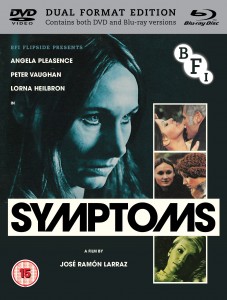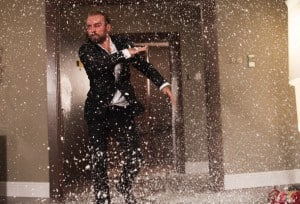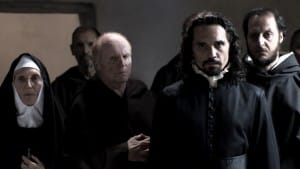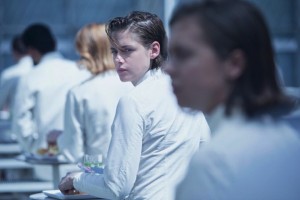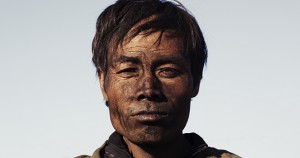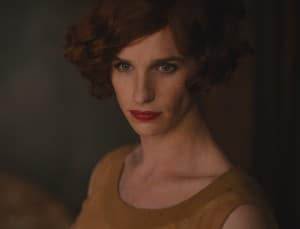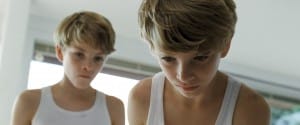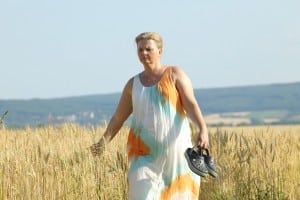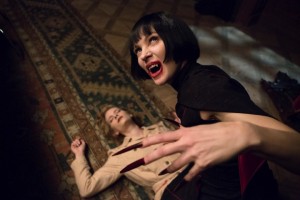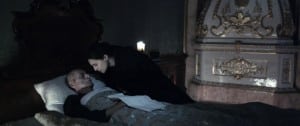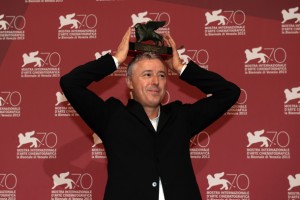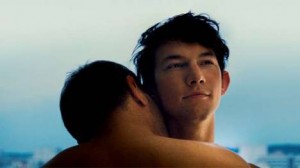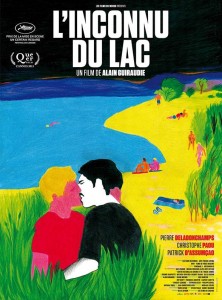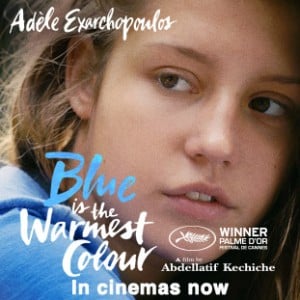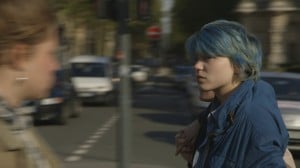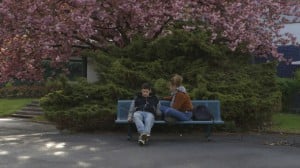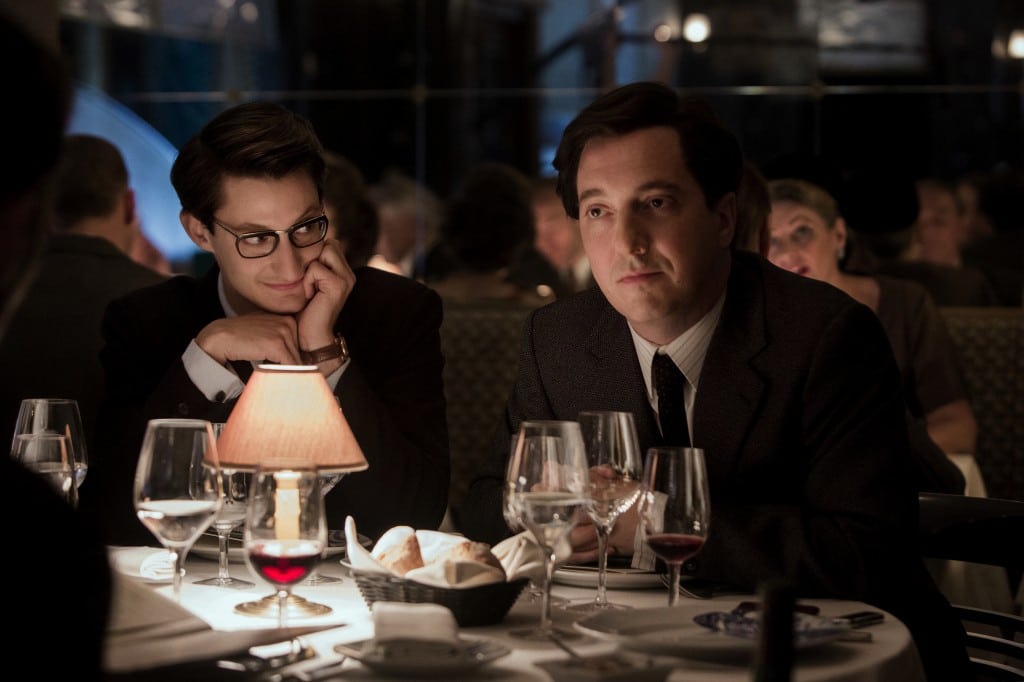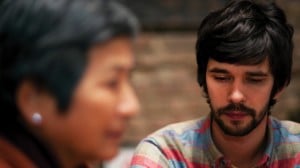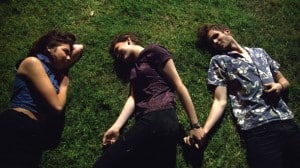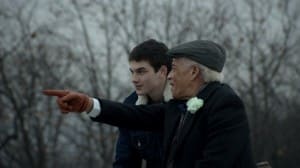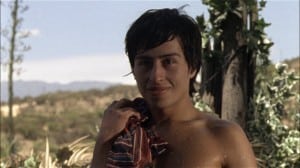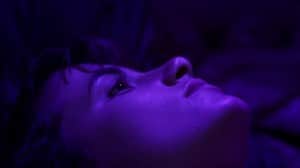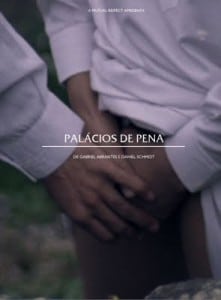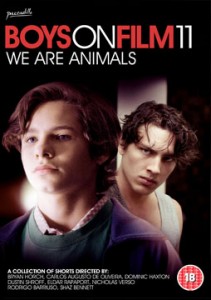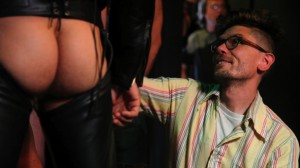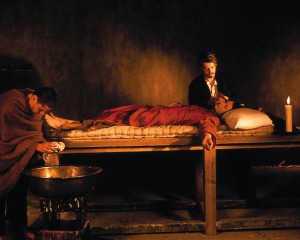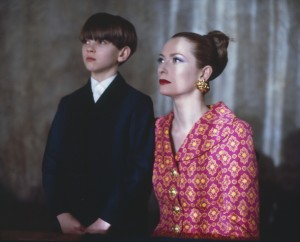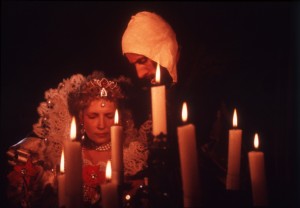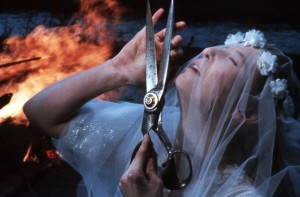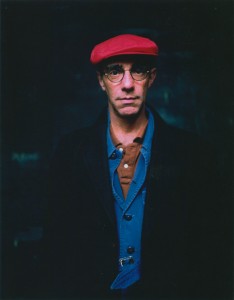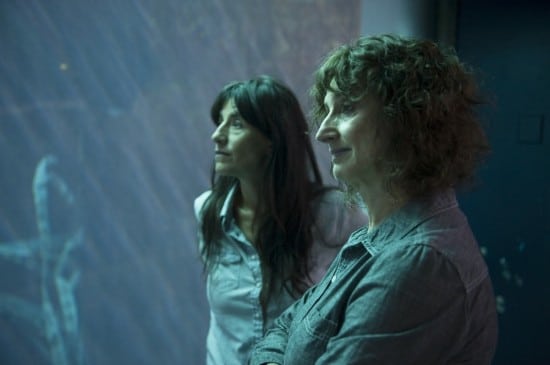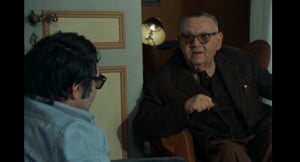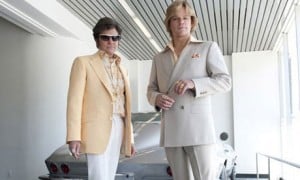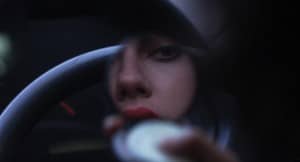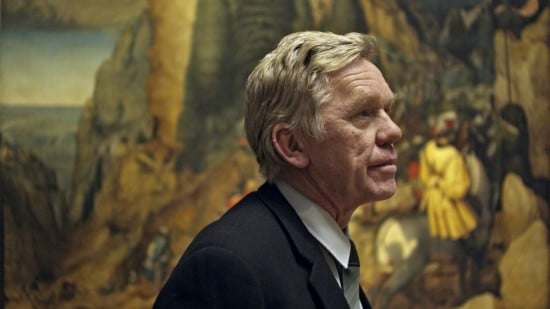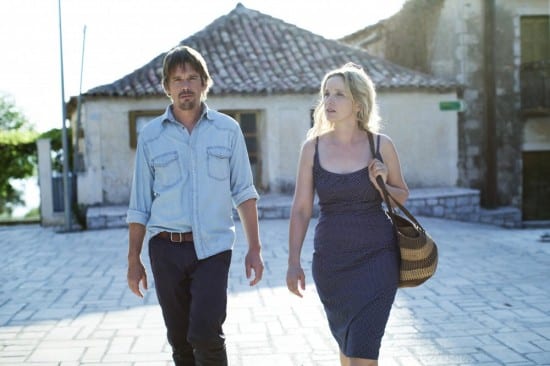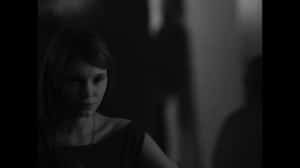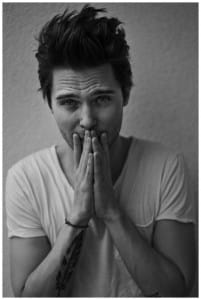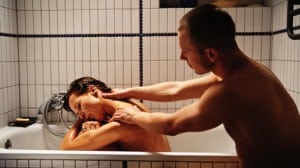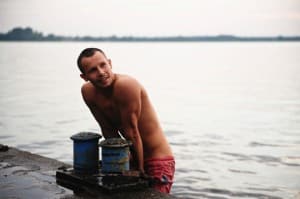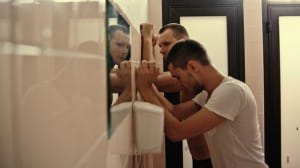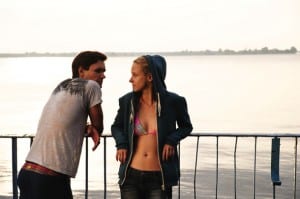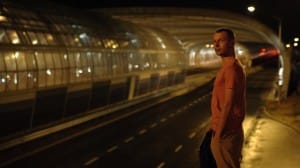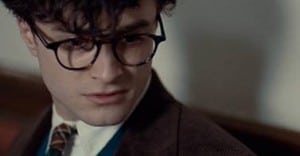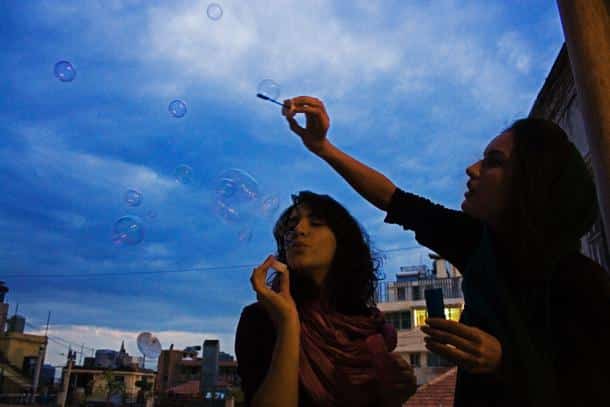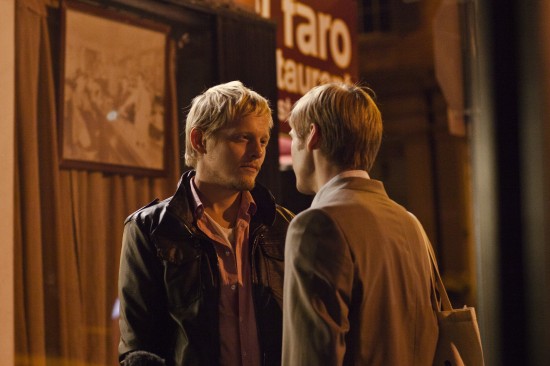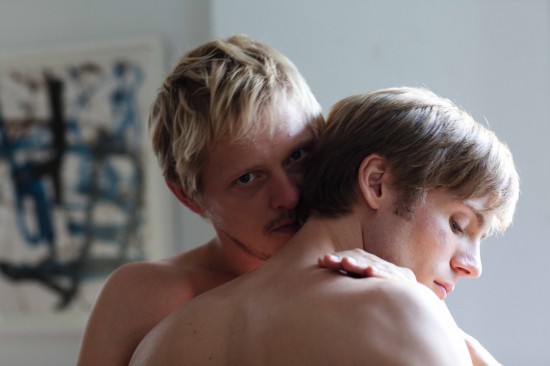Matthew Turner spoke to André Semenza, the director of SEA WITHOUT SHORE which has its World premiere at this year’s GLASGOW FILM FESTIVAL 2105
Fragments of theatre, dance, cinema and poetry co-mingle in this unique and ravishing film, tell us more…
André Semenza (AS): It came about through the rehearsal studio. Fernanda Lippi, the choreographer, and I have worked together since 1999 and also with the Director of Photography, Marcus Waterloo. We have a particular way of working which is almost like improvised theatre, where we work in a rehearsal room and explore things with dances and find themes and have visions. It’s a very intuitive and collaborative kind of process where things start taking shape. So there was a relationship between these two women, Fernanda and Livia, the dancer. Clearly something was happening between them and there was some dramatic material emerging and we started piecing that together, like any script, but in a slightly more intuitive manner. And then I had a vision that we should do it in Sweden – my mother was Swedish and I had visions of horses and people draped over horses. So we started location scouting and it was sort of like a quest into the unknown, really, the search for discovery goes all the way through to post-production when we actually review some of the footage and are surprised by some things. Marcus and I both come from a film background where film used to be very precious, so we’re quite efficient, it’s not just like shooting blindly, although we didn’t have a script or a shot list. We were just looking for stuff that is of interest and has potential and often when you’re able to just hang in a little bit longer, something else happens which is often surprising, whether it’s the performer or the actor gives something extra that we didn’t quite expect. It’s quite real and quite raw, so we had great respect for that, creating the space for this to happen.
 You mentioned that you had visions of horses. Where did they come from?
You mentioned that you had visions of horses. Where did they come from?
AS: Yes. I was sitting in the rehearsal room with Fernanda and Livia – it was a community centre in London that we were using – and I just had these visions of horses, I started drawing horses that these two women would be draped over. We could have done it in England, we were looking at locations, but I just had this inkling we should do it in Sweden.
How did you find those incredible locations, particularly the house?
AS: So we did location scouting there and the thing just sort of snowballed in a very organic manner. We were actually approached by a Brazilian who lives in Sweden who liked our work, he offered to be our location scout. His girlfriend, her brother had access to these incredible locations, the house where we shot it is a family property, it was called the White House, 19th century, it’s an astonishing place, it’s untouched. So we found records on location that we used in the film, the old 1910 records and the wallpaper, it just completely married with the theme of the film. So when you put your neck out there as a director and a producer and you don’t have location scouts and you actually do that yourself, people engage with you much more, in a different manner. And I also shot in an area in the summer where I have ancestry going back 600 years – I’m a strange European mix – but suddenly people came out of the woodwork who knew my great grandfather or something and things just kind of happened. It’s a different process – you put yourself out there and somehow it pulls you back in, to places that you didn’t expect.
 Whereabouts was the house?
Whereabouts was the house?
AS: It’s on one of the islands outside Stockholm. It’s basically owned by this person who we met briefly through this connection. He was extremely generous – he also took us to his mother’s house and just invited us to stay there for a month, ‘Oh, I’m going to Colombia, here’s the key’ – he’d met us for ten minutes! And then this fella’s uncle became the co-producer in Sweden, he found all these Pagan sites where we wanted to film – we were looking for Pagan circles and things like that where we could work with an agnostic theme of this woman looking for her beloved soul that disappeared. And he was a very, very quiet guy, and he said, ‘Yeah, I know a place’ and there was this place, walking distance, which was a sort of a circle where nothing grows and it’s been a sacred site for thousands of years. He asked the girls to take off their gloves and they were warm! It was minus ten! It was all rather odd, but there is a sense of adventure when you work like that and I think it triggers other people’s imaginations as well. And then of course my job and Fernanda’s job is to hone it, to unify that. Because of course, many ideas that we come up with are rubbish, even my own – you try and cling to your own ideas, but actually you have to drop them and all that. So in the end you have something that’s very organic, where the performances, the bodies, the costumes, the wallpaper, the lighting, everything should be – I don’t want to sound pretentious but the gesamtkunstwerk, the whole sensorial experience, covering all the senses, plus the intellect as well. I’m not really a Wagner fan, but he thought opera was it and then cinema became it, where if you’re open to going on a journey you can really have a very sensorial and an intellectual complete experience.
Who or what were your main influences? My editor felt that your film echoed Hungarian director, Gábor Bódy’s Nárcisz és Psyché…
AS: Really? I don’t know that film. Fernanda and I have a physical theatre company together as well, so I’ve always been interested in Grotowski, the Polish theatre giant, Peter Brook was a huge fan. His stuff was very physical but not in a cathartic way, it’s extremely controlled, but you’d see this quite shocking stuff and every night was the same. Technically phenomenal. So I was always interested in that and Fernanda, coming from Trinity Laban [Conservatoire of Music and Dance], having that experience married very well with these sort of things. And of course I trained, Stanislavsky, whatever, so that’s the performance side of things. And from the cinema point of view, I think my greatest influence perhaps was Tarkovsky, I think that’s one of the most shocking experiences I’ve ever had. And of course Ingmar Bergman, speaking Swedish as well. Especially with this film, the voiceover is in Swedish and there’s definitely a Nordic tempo in it. Many film people probably have a similar list of film cinema influences to mine, the Ozus and the Godards and so on, but I think for this film, Tarkovsky and Bergman would be big influences. Dreyer too, Ordet is devastating stuff. Early Fritz Lang too.
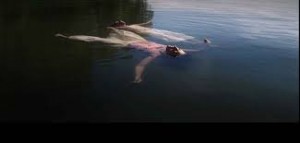 How did co-directing with Fernanda work in practice? Were you responsible for different elements?
How did co-directing with Fernanda work in practice? Were you responsible for different elements?
AS: Well, we did a film before, Ashes of God, in 2003 and I was the director and she was the choreographer. But we felt in this project, because she conceived so much in the rehearsal room – I’m very much the film side of things, the choice of shots with markers, I also edited and so on, but her influence is a deep understanding of the emotional story, sometimes she would have incredible insights and she was just there from the very beginning when it was just people flopping around in a studio looking rather rubbish and then shooting stuff from the beginning and it still looked very rubbish, but then just like nursing it through and being a real coach to the cast, to Livia and to [Anna Mesquita] in particular and of course doing her own work as well. So it’s a situation where we don’t step on each other’s feet at all – she provides material and I can then give my own guidance or input, but she’s not precious about, ‘Oh, you have to shoot all the choreography’ – if you work with a famous choreographer, you have to cover the whole thing and every dancer has to be in shot, so it’s not really cinema, it’s nothing to do with cinema. So it’s very much surrendering all the material to the camera and what the camera falls in love with, and Marcus, the cameraman, is very intuitive as well, so we have this triangular co-creation, shall we say, going on.
And you also did the editing yourself. What was that process like?
AS: I was very concerned about editing myself, because I’m aware that some directors, when they edit, they get very self-indulgent and stuff just rambles on forever, but what we did was basically, I was editing and then I’d put it on DVD, not look at it for a week and then watch it with Fernanda in a different context. And she would be the “Paramount Pictures person”, she would be the outside view, we would talk about it and she would see stuff that maybe I had missed. And of course, I was able to distance myself and have a new appraisal of it, so I’m actually very happy with the edit. Of course, it requires certain patience, it’s not MTV editing, it’s classical stuff, but when I look at the cuts now, the timing is just right. And it was just a slow, patient process like that.
Were Fernanda and Livia always going to play those roles? Was there a casting process?
AS: Livia had worked with us in other productions before, live productions, and we always wanted to make a film project together. She came from Brazil with us and that was the cast. In Stockholm, we approached a senior dancer for that third role and she was unable to do it, but then the person who was approaching her was actually a young dancer herself and we looked at her and thought, ‘Why don’t we try Anna?’ – she’s half Brazilian, half Swedish. It was a very happy coincidence, in a way. So we didn’t have a proper casting in that sense.
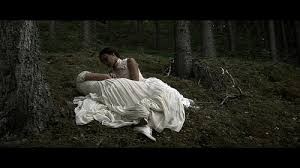 So all the cast members were primarily dancers?
So all the cast members were primarily dancers?
AS: Yes, apart from the lady who works with horses, who is a horse person, really. She used to be a designer, but now she has a farm for horses on their last legs, so to speak, post-career horses. So she was just providing that side of things.
Movement is obviously a very important part of the film – how collaborative was that process? AS you say, Fernanda was the choreographer, but did you work with Fernanda on the movements as the director?
AS: We have very similar taste, Fernanda and I, so we get excited about the same stuff, which is very useful. From my point of view, if I don’t believe something, it’s not going to make it [into the film], it has to be believable, it has to be authentic, even if it’s strange. So that’s always been my filter. I’m not really a contemporary dance person, I don’t really like a lot of contemporary dance, or the vanity, all that nonsense – it’s very much about performance and authenticity and when you capture something it’s a privilege, you feel it’s really tremendous, it’s a unique moment. In terms of editing, as an editor, it’s very much a new choreographic process, shots were slowed down, maybe 80 clips were slowed down, sometimes noticeably, other times not, and the juxtaposition and the breathing, the sense of rhythm is very choreographic, I think, as well. So I’m very much interested in movement. And in terms of the movement of the dance, it should not be a dance film, you know, breaking out in dance, it’s not a musical in that sense – it’s very much an externalisation of these compulsive, almost autistic kind of movements where the person is bereft and at a loss. And I think these movements are quite rooted in this person as well, in Livia, she brought that to the role, so we were able to use some of that material. And so when she dances by herself, it’s a memory, she re-enacts part of what she remembers, and then when she rocks, that’s very much an autistic, kind of lonely thing to do. So I think it should really be, again, not sticking out as ‘Hmm, this is a bit of a dance moment’, but actually being integrated as a whole in the story.
The film presents a narrative of doomed love from a female perspective, but is there a male perspective or is it exclusively female?
AS: Hmm. [long pause] It’s a difficult question, I don’t really know how to [answer that]. For me, I very much identified with that sense of loss. I actually lost my mum in 2005, which was just literally a week after the winter shoot. And of course that grief went into the film. So it’s a feminine film, I think, but also, it’s very hard, because my taste, our live work is quite shocking sometimes, not for the shock value itself, but just because it’s quite visceral. And also, Andrew Mckenzie’s work, the composer, from the beginning, he recorded the dancers’ performance and then created a twenty minute track that was then used in further rehearsals and on location, so they’re using their own sound and it becomes almost esoteric and quite mysterious. His stuff is quite shocking too – shocking is the wrong word, it would silence people, in a good sense. Which I think is what I’ve always loved, when I saw, let’s say Fritz Lang’s M for the first time, I couldn’t speak for two days. You don’t go outside and go, ‘Oh, that was nice’, you’re like [stares, open-mouthed], you want to stay through the credits and that sensation stays with you for some time. And I think Andrew’s music has that effect. As an artist, you always aspire to reach something like that. If you see a Mark Rothko, you feel something beyond just paint and the shapes. Something transcendent, maybe that’s the word.
What was the most challenging aspect of the production? What was the hardest thing to get right?
AS: There were lots of challenges on the shoot, but I see them as adventurous challenges, you know, like getting the boat and the ice-breaker, living in a house with no heating, all huddled together at night, shaking with the cold – all these things were tough, but not in a negative sense, they were part of the experience, of reaching the peak of the mountain, or whatever. But the tough thing really is the editing, when you start putting things together, when you start marrying the summer stuff with the winter stuff, it’s dreadful, you don’t really feel it’s going to work and then suddenly something gives. Editing can be quite a lonely and depressing place, sometimes, but the most difficult part for me, personally, was pushing it through the technological development, because we shot on a format which has now been surpassed, and then getting it through to the DCP, all that process was a real challenge, to be honest. Basically, what we did with Ashes of God, we shot that on digital as well, but went to film and it looked like a film, astonishingly, from DDV cam, it was like 35mm, massively blown up and nobody noticed that it was not film. And all of this was because emulsion is forgiving, but if you don’t have that process and you go from digital through to the final product and you don’t have that emulsion, you will see all the mistakes, all the artefacts, so we worked very hard to minimise that. And that was a long, long process, I’d say two years. Jumping through lots of programs and then you’re losing quality. We ended up doing it in Pinewood with a phenomenal, wonderful grader, who had recently restored lots of BBC films, Martin Greenback and he was just utterly patient and just fantastic. He really saved us.
Did you cut anything out during the editing process that you were sorry to see go?
AS: Well, yes, a lot of the poetry, some of the wonderful lines that we had – [Algernon Charles] Swinburne primarily, but also Katherine Philips, who was a 17th century lesbian poet, and also Renée Vivien. So some of these lines were great, but they just would not stick, or they would be doubling up the message and it would just be a bit too much of a good thing, so they had to go. Sometimes less is more and all that stuff. There were some dance scenes where we actually got a whole bunch of local dancers to dance for us, traditional dance, Midsummer Night’s Dance, wonderful stuff in Sweden, if you think of Miss Julie and all that stuff. And they’re not in the film – it just didn’t look right. We worked very hard to try and make it work, but all we have left is a bit of music in the background.
How did you go about choosing the text for the film and did you write any original text for the film?
AS: Yes, we did. Basically we wrote the stuff which I thought was too on the nose. Fernanda wrote some beautiful stuff which had to do with her sister, in fact. And that was very much of interest. And then I started reading massive anthologies of lesbian literature, from the 1500s onwards, and I came across a lot of interesting people, including Katherine Philips and I stumbled upon Anactoria by Swinburne, which is Sappho speaking to Anactoria and he’s a great poet and it’s wild stuff. And somehow that really reverberated. So it was a collage of fragments that I brought in, about thirty pages. And then I felt that it should be in Swedish, because these women are in Sweden and you could logically justify it in that, for instance, Renée Vivien was English and she was blue-blooded and inherited a massive fortune, and she had a massive fight with her mother, so much so that she left for France and just abandoned her Englishness and spoke French and wrote in French. So it felt like these are clearly not Swedish women, they are South American women in Sweden, looking for a kind of Pagan liberation, perhaps getting away from the macho South American world and so on. So I felt it should be in Swedish, but this was all very intuitive stuff, so I sent it to a great translator that somebody recommended and when I got the translation back, I just burst into laughter with pleasure, because she had actually managed to capture the essence of the poetry and in some cases even improved on it, if I may say so. I hope Swinburne’s not listening! But it was just, ‘Wow, this is great!’ And then, recording this, we had a Chilean Swedish lady doing a lot of the voiceover, with a great voice, and also Fernanda. Fernanda doesn’t speak a word of Swedish, and she didn’t even want to know the meaning of the sentences, and I was coaching her, and I actually felt that it was great that she didn’t know, because she would just deliver it without intention. I felt that was a very interesting way, almost like an Ozu or a Bresson way of approaching acting, where you strip things of meaning and emotion and just get the purity. So Fernanda was just repeating after me, like a parrot, so it had a very hypnotic quality, to me, and, I felt, a musical quality. So there were all kinds of factors, the voiceover script is also a musical score, I feel. It ranges, and it gives the passion, the rage, the loss, the tenderness, all the kind of things that you have in a love relationship, but also, because of the voices and the South American vibrato of the voices, there is a kind of musical quality, it goes into the music track, really.
Do you see it as a lesbian film in particular?
AS: Yes, lesbian, but not with a capital L. It’s very much about human beings, you know, it’s clearly a love story between two women, but we’re not really carrying the flag or something like that. In a lot of my work, sometimes there are gay characters and so on, so it is a lesbian film, yeah, but with a lower case L.
What’s your next project?
AS: I have two films to finish, that we shot in Brazil. They’re smaller films, but they’re dance / physical theatre films. And we have a film that we want to revive, that I raised finance for in the 90s, a great, great project, it was a triangular relationship, a psychological drama, with Lothaire Bluteau, from Jesus of Montreal. So I’m very keen to revive it now, but setting it a century earlier, because we’re very much into this late, decadent poetics kind of thing. We’ve gone to many congresses and become very friendly with these academics and studied these water painters and Oscar Wildes and Swinburnes and it’s just a very, very interesting world where I felt that the late Victorians, these guys really pushed the boat out, they were the punks of the time, so if we put this story in 1890s Britain, I think it would be very interesting. So that will be the next project.
[youtube id=”V17y1SYuyTs” width=”600″ height=”350″]
SEA WITHOUT SHORE | WORLD PREMIERE | GLASGOW FILM FESTIVAL 2015

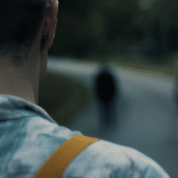



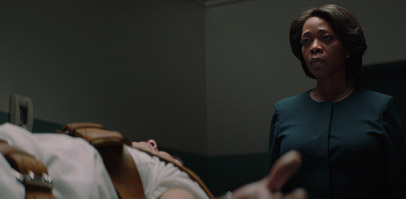
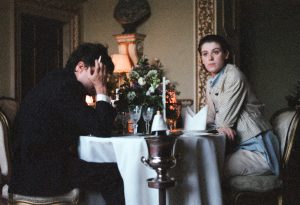
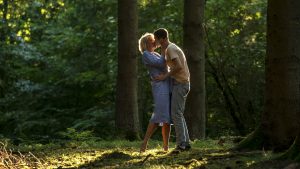


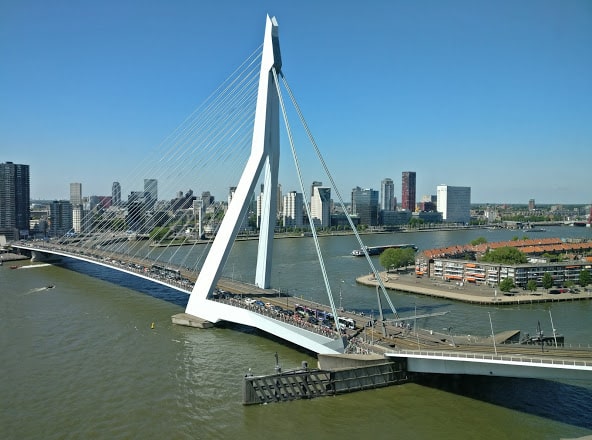 This year’s Rotterdam Film Festival takes place from 23 January until the 3rd February with the latest World premieres running alongside 4 sections entitled Bright Future, Voices, Deep Focus and Perspectives – and a cutting-edge arts programme to add a cultural dimension to the 10 days, and this year includes SLEEPCINEMAHOTEL a one off project by Apichatpong Weerasethakul, and never before seen outtakes from Sergei Parajanov’s masterpiece The Colour of Pomegranates (196
This year’s Rotterdam Film Festival takes place from 23 January until the 3rd February with the latest World premieres running alongside 4 sections entitled Bright Future, Voices, Deep Focus and Perspectives – and a cutting-edge arts programme to add a cultural dimension to the 10 days, and this year includes SLEEPCINEMAHOTEL a one off project by Apichatpong Weerasethakul, and never before seen outtakes from Sergei Parajanov’s masterpiece The Colour of Pomegranates (196 T I G E R C O M P E T I T I O N
T I G E R C O M P E T I T I O N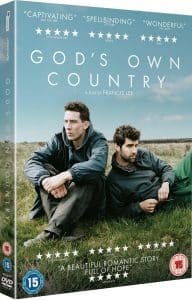 Dir.: Francis Lee; Cast: Josh O’Connor, Alec Secareanu, Gemma Jones, Ian Hart; UK 2017, 104 min.
Dir.: Francis Lee; Cast: Josh O’Connor, Alec Secareanu, Gemma Jones, Ian Hart; UK 2017, 104 min.